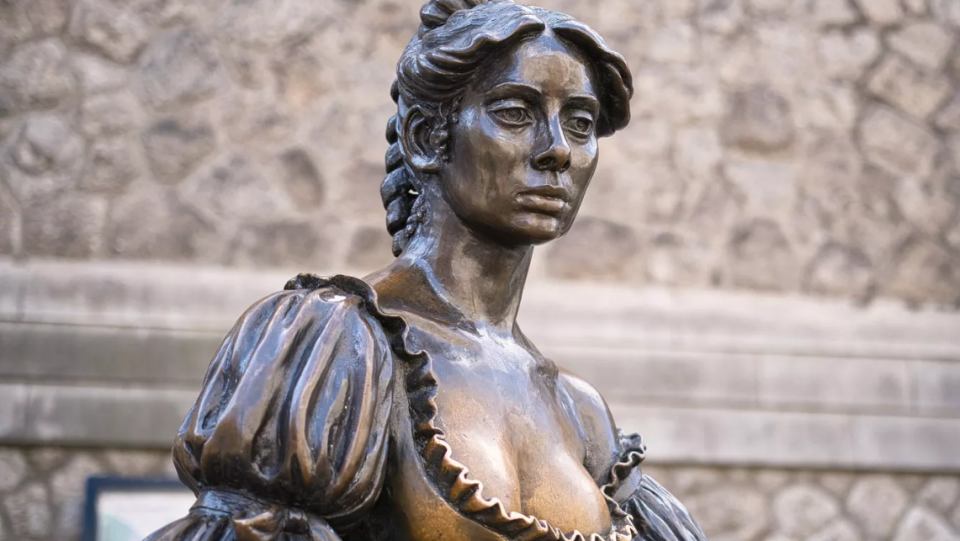Regular readers might fondly remember April Fool’s Day of this year, when fondling became a hot political issue. Specifically, it was the day on which Dublin City Council felt obliged to tell reporters that their press release announcing a task force of bouncers to protect the Molly Malone statue from molestation was “not an April Fool’s Day joke”.
Dublin’s politicians are very concerned about Molly’s ample bosoms, you see, and the way in which tourists in particular have come to believe that giving the breasts in question a gentle caress is a form of good luck charm. This open, broad daylight boob-brushing has particularly offended the Social Democrats, whose councillor Cat O’Driscoll is determined that the titty-touching masses should be prevented from taking their jollies off the statue.
Well, yesterday, things took a turn. It appears that the bouncer strategy has not worked, and thus Councillor O’Driscoll has a new plan: Dublin City Council will surround the statue with flowers, in order to ensure that nobody not named Inspector Gadget will be able to cop a feel of Molly’s perfectly sculpted mammaries.
Over at the Daily Star, which broke this story yesterday, reporter Danny de Vaal recounts that emails to the City Council on this issue are divided. He quotes one member of the public as saying that the statue’s fondling is a harmless piece of fun. And he quotes a young female member of the public as saying that the public’s interference with dear Molly is deeply upsetting to her because it “objectifies and dehumanises” the women of our Capital City.
But here’s the thing: Not all opinions are created equally.
And here’s another thing: The statue of Molly Malone is not a human being. It does not have human rights or human dignity. It was sculpted, presumably deliberately, with a provocatively large pair of breasts that are designed to draw the eye. Human nature being what it is, people (of both sexes) apparently feel drawn enough to those bronze breasts to touch them.
The question here is not whether touching the statue is a good thing or a bad thing. Personally, I’d (pardon the pun) feel like a bit of a tit doing so. No, the question is whether the statue’s boobs are worthy of public expenditure in order to prevent people doing what appears to be an entirely natural and instinctive thing that ultimately harms nobody.
I will note here that Dublin City Centre, which is home to the statue, is also home to a range of much more harmful human activities. The City Centre is for example home to fully seven methadone clinics which dispense free drugs to heroin addicts. It has also over the past decade or so become a hotbed of petty crime, robbery, and anti-social behaviour of which touching the statue is the mildest expression. If you wanted to be very slightly provocative, you could note with some accuracy that the City Council appears more interested in protecting a cast iron statue of a woman than it does in protecting the much greater number of actual women who are exposed to unpleasantness in their city on a daily basis.
This isn’t even a Dublin thing, by the way: Touching statues is a thing tourists do around the world. Look up a google image of the famous Statue of Juliet in Verona, Italy, and you will see that Shakespeare’s heroine has had her own breast area touched to such an extent that it is pale from the neck down. Look up Abraham Lincoln in his tomb in Illinois, and you’ll see that his nose is white from all the rubbing. Those of you who have been to Wall Street and seen the statue of the Charging Bull will note that the testicles of that statue have been rubbed to paleness by generations of women who either seriously or jocularly think it a fertility boon.
So this isn’t even about women’s rights: It’s also about what oddballs we have become in Ireland. Imagine being the tourist who walks down the boardwalks along the Liffey, spotting the mandatory collection of the homeless, the addicted, and the downtrodden, only to find that the best policed part of Dublin is a busty statue. What might you think of that society’s priorities?
Ultimately, we have a choice here: Be a serious society, or be an utterly ridiculous one. If Dublin City Council gets its way, it will be Option B.
It’s not a massive story, but it does tell us a lot about our politicians, our society, and what a really weird little place this country has become.

